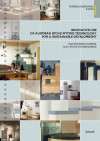Suchergebnisse für "Factsheet: Energietechnologien gestalten, die für alle sinnvoll und nutzbar sind"
smartEXT - extended application boundaries for proven passive house technology
The present study aims to explore the application options for compact units (ventilation devices including micro heat pumps, developed for passive houses) in low energy buildings. Compact ventilation units for heat recovery, heating and domestic hot water shall bear the basic heating load, whereas peak loads shall be covered by newly-developed auxiliary heating equipment combined with intelligent control algorithms. This allows increased energy efficiency as well as cost effectiveness together with higher living quality and lower ecological load.
Smart Metering consumption
The project Smart Metering consumption focused on the energy consumption of the future smart metering infrastructure - an issue not widely discussed until now.
IEA SHC Task 60 - Industry Workshop Photovoltaic/thermal (PVT) Systems
08. May 2019
University of Technology, Eindhoven, NL
The international public workshop on PVT technology provides the opportunity to learn about the latest developments in international research, development and commercialisation of PVT-Systems.
Journal paper by IEA EBC Annex 66 operating agents together with Austrian contributors

Occupant behavior modeling for building performance simulation: current state and future challenges. (Energy and Buildings Volume 107, pages 264-278, November 2015)
D. Yan, W. O’Brien, T. Hong, X. Feng, H. B. Gunay, F. Tahmasebi, A. Mahdavi
Herausgeber: Elsevier B.V.
Englisch
Downloads zur Publikation
Journal paper by Austrian contributors of the IEA EBC Annex 66

The deployment-dependence of occupancy-related models in building performance simulation. (Energy and Buildings Volume 117, pages 313–320, April 2016)
A. Mahdavi, F. Tahmasebi
Herausgeber: Elsevier B.V.
Downloads zur Publikation
Business model innovations for rental and service models in the manufacturing sector
The project aims to contribute to a better understanding of the economic and ecological potentials of an implementation of lending and service models in the manufacturing sector in Austria and to show which changes and R&D efforts are necessary so that these can be realized by suitable business models.
EDEN - Developement of a structured data and preparation documentation with a minimized error-proneness for energy performance cerificates.
Current energy performance certificates hold major flaws. Therefore, the presented research initiative aimed at the development of a standardized and easy-to-use, generic Input-Data-Documentation, which ensures the quality of energy certificates for all involved stakeholders. During the development, the documentation had been conducted and for a chosen sample of representative buildings, which is expected to demonstrate the high potential of such a development.
Use of thermal cooling technologies and optimal combination with other heat energy consumers to use during summer the available district heating based on renewable energy sources: example of the municipality of Mureck
Optimal use of heating energy from a biogas CHP in the municipality of Mureck through demand side measures; the multifunctional energy centre Mureck on the way towards thermal air-conditioning: Multi-Mukli
old house? old house!

The renovation and restructuring of existing housing stock using modern, ecologically efficient building technology as a means for developing Assisted Living Centres for senior citizens within an urban context
BIGMODERN Subproject 7: Monitoring concept
Development of a pattern for comprehensive documentation of the project results. The concepts contain amongst others monitoring of energy consumption, resources, costs, functionality and comfort, etc.
Living Lab Vorarlberg
The methodology of living labs centers the requirements of the user into the development process. The original approach of the MIT should be adapted to the sustainable discrete production in the region of Vorarlberg as a living lab.
Strategy development for (technical / economical feasibility of) energy autarcic buildings
Development of a strategy for energy autarcic buildings with appropriate Technology solutions.
First passive-house school reconstruction

Factor 10 refurbishment of the General Secondary School II and Polytechnic School of Schwanenstadt (Upper Austria) with prefabricated wooden façade elements and with a comfort ventilation system.
IEA Energy in Buildings and Communities Programme (EBC TCP)
The Energy in Buildings and Communities Programme by the IEA enables collaborative research and development projects. Thematically, it focuses on integrating energy efficient and sustainable technologies in buildings and communities.
Energy system - Industrial region
Analysis of success factors, restrictions and risks on the development and implementation process caused by the system integration of renewable energy technology in industrial regions with higher energy demand.
Solar Heating And Cooling in Austria (Faninger, 2009)

Status Report 2009 on Research, Development and Market Deployment of Solar Thermal Technologies in Austria. Presented to the IEA Solar Heating and Cooling Programme in July 2009
Innovative Use Of Austrian Stove Fitting Technology For A Sustainabl Development

Tile stoves in Austria - Clay stoves in Zimbabwe
Forschungsforum
2/2000
Herausgeber: BMVIT
Englisch, 6 Seiten
Downloads zur Publikation
Development of a new generation of grid-connected PV inverters
Improvement of operational parameters (efficiency, quality of current waveform, reduced size and weight) and reduction of manufacturing costs
Research and Innovation for Heating and Cooling with Renewable Energy Sources

position paper related to biomass, geothermal energy, solar thermal energy and heat pumps in order to support persons responsible for Austrian energy research programs to define main research and innovation topics for renewable heating and cooling within these programs
Schriftenreihe
28/2014
Englisch
IEA C3E Workshop Women in Energy
11. April 2019
Haus der Forschung, Ground floor, Sensengasse 1, 1090 Vienna
Learning from International Initiatives and Austrian Good Practices
